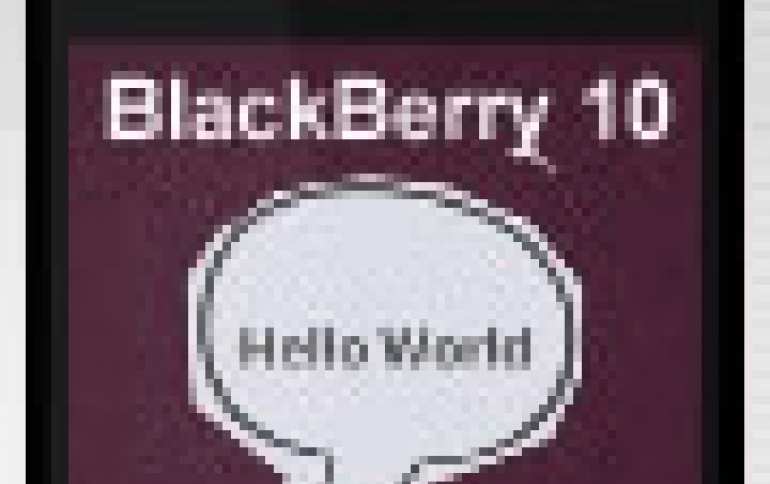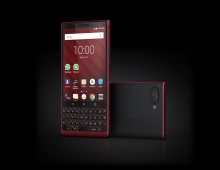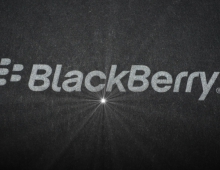
RIM Releases BlackBerry 10 Platform To Developers
Research In Motion today unveiled its BlackBerry 10 platform at the BlackBerry World conference in Orlando, Florida and released the initial developer toolkit for native and HTML5 software development.
The toolkit is available in beta as a free download from http://developer.blackberry.com.
The Orlando-based company is trying to lure app developers with the release of the new software tools looking to create applications for its new BlackBerry 10 platform.
RIM is aiming to reverse market-share losses to Apple and Google's Android, with the relese of its next-generation BlackBerry 10 devices some time next year.
"Developers building for BlackBerry 10 will be able to easily create the kind of cutting-edge apps that deliver truly engaging experiences and 'wow' customers, whether through integration with native features and other apps like BBM or by leveraging the new signature design elements of this new and powerful mobile computing platform," said Alec Saunders, Vice President, Developer Relations and Ecosystems Development, RIM.
Developers can use this first beta of the tools to get started building apps for BlackBerry 10 and as the tools evolve over the coming months, developers will have access to an API set that will allow them to build even more integrated apps.
The toolkit includes the BlackBerry 10 Native SDK with Cascades, which allows developers to create graphically rich native applications in C/C++ using Qt. The Native SDK for BlackBerry 10 has a set of APIs (Application Programming Interfaces) that give developers access to core device features and a range of BlackBerry application services, such as Push and Payment services. Cascades is a native application development toolset that allows developers to build applications without having to write complex, low-level graphics code.
The toolkit also includes support for HTML5 application developers with the BlackBerry 10 WebWorks SDK, allowing them to create applications using common web programming technologies. The BlackBerry 10 WebWorks SDK allows developers to use HTML5 and CSS for building apps and provides JavaScript bindings to native device APIs along with RIM?s open source UI toolkit, bbUI.js, to create applications with native-like capabilities. In this initial release of the BlackBerry 10 WebWorks SDK, developers have access to a core subset of the full WebWorks APIs, including Identity, Application and App events, System and system events.
Applications created with any of the BlackBerry 10 tools will run on BlackBerry 10 smartphones as well as BlackBerry PlayBook tablets when the new platform becomes available for the PlayBook.
For more information on the BlackBerry 10 toolkit, visit devblog.blackberry.com.
To kick-start the effort, RIM is also handing out the the "Alpha Dev" prototype device to developers at its BlackBerry World conference in Orlando. The handset will enable them to test how their creations perform on the new platform.
Alpha Dev looks like a smaller version of RIM's PlayBook tablet, complete with a touch-sensitive frame that a user swipes to call up a menu.
RIM has around 15,000 apps for its PlayBook tablet and 70,000 apps for its smartphones or the tablet, compared with 200,000 iPad apps, and half a million for the iPhone.
The Orlando-based company is trying to lure app developers with the release of the new software tools looking to create applications for its new BlackBerry 10 platform.
RIM is aiming to reverse market-share losses to Apple and Google's Android, with the relese of its next-generation BlackBerry 10 devices some time next year.
"Developers building for BlackBerry 10 will be able to easily create the kind of cutting-edge apps that deliver truly engaging experiences and 'wow' customers, whether through integration with native features and other apps like BBM or by leveraging the new signature design elements of this new and powerful mobile computing platform," said Alec Saunders, Vice President, Developer Relations and Ecosystems Development, RIM.
Developers can use this first beta of the tools to get started building apps for BlackBerry 10 and as the tools evolve over the coming months, developers will have access to an API set that will allow them to build even more integrated apps.
The toolkit includes the BlackBerry 10 Native SDK with Cascades, which allows developers to create graphically rich native applications in C/C++ using Qt. The Native SDK for BlackBerry 10 has a set of APIs (Application Programming Interfaces) that give developers access to core device features and a range of BlackBerry application services, such as Push and Payment services. Cascades is a native application development toolset that allows developers to build applications without having to write complex, low-level graphics code.
The toolkit also includes support for HTML5 application developers with the BlackBerry 10 WebWorks SDK, allowing them to create applications using common web programming technologies. The BlackBerry 10 WebWorks SDK allows developers to use HTML5 and CSS for building apps and provides JavaScript bindings to native device APIs along with RIM?s open source UI toolkit, bbUI.js, to create applications with native-like capabilities. In this initial release of the BlackBerry 10 WebWorks SDK, developers have access to a core subset of the full WebWorks APIs, including Identity, Application and App events, System and system events.
Applications created with any of the BlackBerry 10 tools will run on BlackBerry 10 smartphones as well as BlackBerry PlayBook tablets when the new platform becomes available for the PlayBook.
For more information on the BlackBerry 10 toolkit, visit devblog.blackberry.com.
To kick-start the effort, RIM is also handing out the the "Alpha Dev" prototype device to developers at its BlackBerry World conference in Orlando. The handset will enable them to test how their creations perform on the new platform.
Alpha Dev looks like a smaller version of RIM's PlayBook tablet, complete with a touch-sensitive frame that a user swipes to call up a menu.
RIM has around 15,000 apps for its PlayBook tablet and 70,000 apps for its smartphones or the tablet, compared with 200,000 iPad apps, and half a million for the iPhone.





















